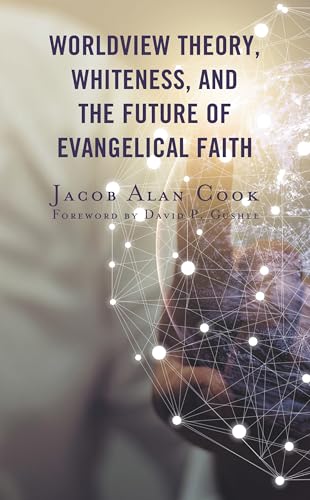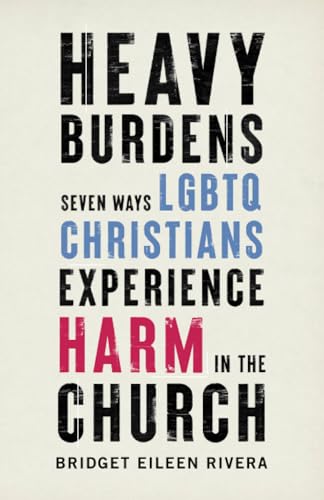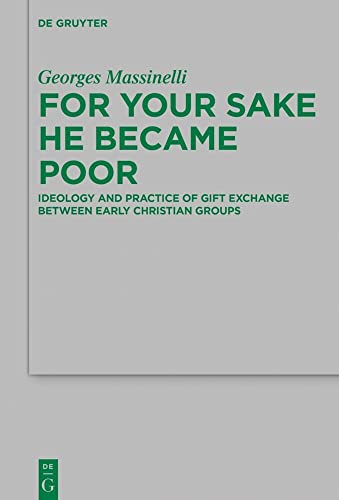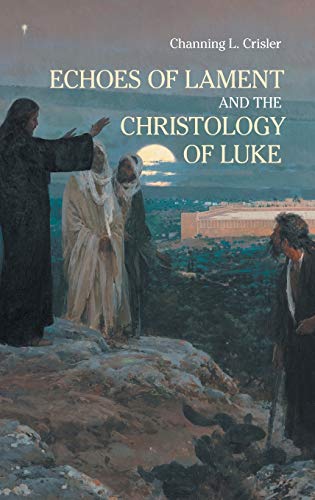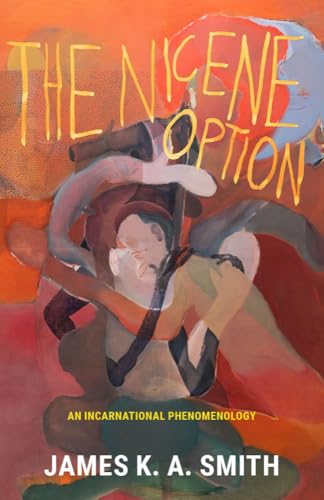Worldview Theory, Whiteness, and the Future of Evangelical Faith
Written by Jacob Alan Cook Reviewed By Neil ShenviLast fall, Professor David Gushee wrote an article praising various scholars engaged in the “intellectual deconstruction of … ‘evangelicalism’” (“The Deconstruction of American Evangelicalism,” Baptist News Global, 11 October 2021, (https://tinyurl.com/4uz2az7m). Many people would recognize the books he cited: Kristin Kobes Du Mez’s Jesus and John Wayne (New York: Liveright, 2020), Beth Allison Barr’s The Making of Biblical Womanhood (Grand Rapids Brazos, 2021), Jemar Tisby’s The Color of Compromise (Grand Rapids: Zondervan, 2019), and Andrew Whitehead and Samuel Perry’s Taking America Back for God (New York: Oxford University Press, 2020). All these works were read widely in evangelical circles and received coverage from media outlets like NPR, the New York Times, and the Washington Post. However, one book on Gushee’s list is less well-known, presumably because it isn’t written for a popular audience. That book is Jacob Allan Cook’s Worldview Theory, Whiteness, and the Future of the Evangelical Faith.
An ambitious and scholarly volume, packed with endnotes and drawing on psychology, theology, and critical theory, Worldview Theory is not an easy read. Cook structures his work around three influential evangelical theologians: Abraham Kuyper (former prime minister of the Netherlands), Harold Ockenga (founder of Fuller Theological Seminary), and Richard Mouw (former president of Fuller). All three men deployed the concept of worldview in their work to make sense of the Christian life and to guide Christian socio-political engagement. In the final chapter, Dietrich Bonhoeffer is presented as a foil to these figures, since Cook sees his work as offering an alternative to the “world-viewing impulse” so deeply engrained within modern evangelicalism.
It’s challenging to summarize a work as dense as Worldview Theory but Gushee’s three-page foreword does an admirable job. Here is its opening paragraph:
It is a time of profound deconstruction of white American evangelical Christianity. The illusions and delusions, the prejudices and harms of a religious group with whom many of us once identified are currently being unveiled, attacked, and abandoned. Where #exvangelicals have not given up entirely on faith, seedlings of postevangelical Christian discipleship are being planted. (p. vii)
Gushee goes on to say that the idea of a “Christian worldview,” which challenges Christian laypeople and scholars to run “all fields of human inquiry … through biblical categories,” has dominated evangelicalism for decades (p. vii). However, Gushee now believes (as Cook goes on to argue) that “the ‘world-viewing’ project needs to be deconstructed both as a way of thinking about knowledge and as a paradigm for forming Christian disciples” (p. viii). According to Cook, “world-viewing” was “tainted by European white supremacism from the beginning” and was “deployed as part of the European colonial project” and so “has always dripped with cultural chauvinism” (p. viii). While evangelicals assumed that their worldview was drawn from Scripture, it was “very, very often” the case that “white/straight/Protestant/evangelical world-viewers simply imported their social location and its blind spots into ‘The Christian Worldview,’ with effects sometimes just irritating and sometimes truly disastrous” (p. viii). Thus, the aim of Cook’s work is not to reform our understanding of the “Christian world-view” but to reject it in favor of “interpersonal knowing, based on relationship with God and people” (p. ix).
Cook identifies at least three problems with “the world-viewing impulse,” by which he means our desire to understand the world in terms of a “[lean] structure of principles that make sense of the whole, including oneself and God” (p. 13).
First, Cook believes that the “world-viewing” impulse is fundamentally the same temptation faced by Adam and Eve in the Garden of Eden, the desire to “become like God.” Cook argues that world-viewing abandons “a social way of being and ‘knowing’ God and one another” (p. 267) in favor of seeking to know good and evil “‘on the basis of an idea, a principle, or some prior knowledge about God’” (p. 266, citing Bonhoeffer’s Creation and Fall). He similarly writes, “World-viewing does not flow from the reversal of our cognitive rebellion; rather, it is the cognitive structure of that very rebellion once we have abandoned our limit as creatures within the created world” (p. 291, emphasis added). World-viewing presents itself as a pious enterprise, which seeks to understand God, the universe, and our place in it in terms of universal, abstract propositions when, in reality, world-viewing is an impious rejection of our creatureliness, an attempt to sit on God’s throne and see the world from his divine perspective.
Second, Cook believes that world-viewing simplifies people, alienating us from them and even us from ourselves: “the conceptual form [of ‘world-view’] inaccurately represents and sinfully mishandles everyone it imagines while providing exhilarating psychological motivation for the powerful world-viewer to press on” (p. 29). To claim that one person has a “Christian worldview” while another has a “Marxist worldview” or a “Buddhist worldview” is to flatten, and even do violence to, the complexity of every individual. Moreover, world-viewing obscures the ways in which our own identities are multivalent rather than singular. Claiming to have a single, salient “Christian identity” and a comprehensive, coherent “Christian worldview” makes us arrogant: “Misplacing the concreteness of a confessed unity in one’s prototypic self-concept offers us too much confidence in our inner unity and leaves us less open to the ways the world, others, and even ourselves do not conform to our neat ideals; in fact, it can even motivate us to avoid acknowledging this sometimes painful reality” (p. 87). This is particularly true of those with a “privileged, normative status (e.g., as a white heterosexual male American)” (p. 86) to the extent that “the unquestioned structural integrity of one’s consciousness—conceived under a single salient identity (e.g., evangelical)—in many white persons is, in itself, a kind of social-psychological pathology” (p. 98).
Third, what theologians and apologists tout as “the Christian worldview” is actually a product of their social location. Their “Christian worldview” is an amalgamation of their political beliefs, personal prejudices, and social assumptions all passed off as the clear teaching of Scripture. According to Cook, this tendency is evident in Kuyper: “What appeared to [Kuyper] as a rationally consistent, Bible-extending theory of everything actually held together in nineteenth-century colonial race-logic, and his reading of Scripture undergirded his racism and cultural imperialism” (p. 57). It is evident in Ockenga: “Ockenga and company were, in fact, playing identity politics as evangelicals [so] their agenda was also influenced by their whiteness, US patriotism, Republican partisanship, sexuality, and so on—the stuff of their Christian tribalism” (p. 141). It is evident in Mouw, who “[carried] the marks of whiteness” in his “approach to resolving the tensions around same-sex marriage” (p. 232). The problem is not that these particular theologians deployed the concept of “world-view” incorrectly. Rather, the very concept of a Christian worldview itself is flawed because it is predicated on an omni-competent world-viewer who will pass off his limited, biased, socially-conditioned perceptions as divine truth.
Of particular concern to Cook is the way that “the Christian world-view” is a product of “whiteness.” Cook cautions us that “whiteness” is “not exactly about ethnicity or specifically about skin color” (p. 13). Rather, it “means involvement in the ubiquitous, transparent norms of reality. It means feeling right, feeling like a well-meaning person” (p. 13). Elsewhere, “whiteness is one prevailing head of an enduring, hydra-like problem generated atop humankind’s deep insecurity following the first humans’ alienation from the garden and its God” (p. 14). Whiteness is “about the ability to disappear into one’s perspective; to claim a cool, rational blandness; to assume self-normativity while only superficially registering the world’s contestation” (pp. 182–83). It “appeals to common sense, neutral Christian orthodoxy, and the uninterpreted meaning of Scripture” (p. 183). Crucially, “whiteness” has so thoroughly suffused our culture (and the world via colonialism) that even non-white-skinned people can participate in “whiteness”: “Throughout his writings, [Black evangelical Bill Pannell] describes how he began to discover within his own patterns of thought signs that whiteness had colonized his mind” (p. 157). Whiteness, like sin, is ubiquitous and, like sin, it must be exposed and expunged wherever it is encountered.
Like many of the other books in the evangelical deconstruction genre, Worldview Theory suffers from a serious under-engagement (one might even say non-engagement) with Scripture. Cook’s most lengthy discussion of the actual text of Scripture comes via Bonhoeffer’s decidedly non-exegetical reading of Genesis 3. Otherwise, Cook’s analysis is almost entirely psychological, sociological, or historical in nature. Even when he interfaces with theology, he rarely makes more than general references to “communion with God” (p. 93) or our “creaturely limit” (p. 278). This is a serious short-coming given Scripture’s repeated injunctions for us to “be transformed in the renewing of [our] minds” (Rom 12:2), to “love God with all [our] mind” (Matt 22:37), and to “take captive every thought to make it obedient to Christ” (2 Cor 10:5). One might certainly argue that none of these verses is enjoining us to adopt a singular, coherent Christian worldview. But, of course, that is the kind of exegetical argument that needs to be made not merely assumed.
Second, one of Cook’s fundamental arguments against “world-viewing”—namely, that it necessitates a hubristic attempt to “see the whole world” from God’s perspective—seems fundamentally wrong. One need not see the whole world or arrogantly imagine that one sees the whole world in order to affirm truths about the whole world. For example, it would be arrogant for my 12-year-old to attempt to make pronouncements about how to drive a car. However, if I told my 12-year-old “The emergency brake is on the left. Make sure not to touch it” and instructed him to inform his siblings, then it would not be arrogant for him to believe me and obey me. In the same way, human beings do not need to assume we have a God’s-eye view of reality in order to trust what God has told us about reality. We do not need to know all things exhaustively to know some things truly. Therefore, the argument that human beings have arrogated to themselves knowledge that belongs only to God is predicated on the (false) assumption that God has not communicated certain universal truths to us in the Bible. Moreover, Scripture never suggests that there is a strict dichotomy between knowing God relationally and knowing propositional truths about God. On the contrary, it is in part through knowing propositional truths about God that we come to know God better relationally.
Third, there is certainly a danger that we can “overelaborate” the Christian worldview. Kuyper seems to have fallen into this error, by seeing all kinds of political, economic, and cultural beliefs as necessary and obvious elements of “the Christian worldview.” However, some minimal Christian worldview seems not only possible but necessary. For example, the Nicene Creed affirms that the universe was created by the triune God of the Bible, that Jesus came to die for us, and that he will one day return to judge humanity. This is a particular way of viewing the world that offers particular answers to basic questions about reality. These answers differ markedly from the answers that would be provided by a Marxist, a Muslim, or a Buddhist. I don’t see how we can avoid calling this minimal set of affirmations a worldview, even if it is not detailed. Moreover, Cook alludes to the fact that when theologians like Ockenga and Mouw described the Christian worldview they did indeed refer to this kind of thin framework shared by all Christians which could then be elaborated or filled in by various thick Christian traditions. So even if we fully agree with Cook’s criticism of Kuyper’s overreach, it by no means follows that we must jettison the very concept of a worldview.
Fourth, Cook’s criticisms of “world-viewing” can be applied just as well to any kind of systematic theology and to any universal theological claim, including his own thesis about the sinfulness of world-viewing. Thus, if his criticisms were valid, we’d have to jettison far more than “world-view theory.” Cook admits as much towards the end of his book where makes statements like the following:
Life with God in Christ is not about humans grasping and fulfilling God’s lawlike will as uncovered and organized into a comprehensive (abstract) life-system, but about humans living as creatures before the person of God, within their creaturely limit. (p. 279)
The chief problem plaguing God’s people is not unrighteousness owing to their inability to fulfill the Law (as revealed by its so-called elenctic purpose in Calvinist theology), but the intermittence of their openness to the law’s Lord while enslaved to its letters. (p. 281)
Bonhoeffer resists the objectification of God in any sense, including the frequent appeal of some evangelicals to Scripture’s verbal inspiration. Scripture as an epistemological resource in the way that modern philosophy has taught us to hold it must be sacrificed to God in faith that it will be given to us, as a way of knowing, as the (sub)text of a conversation between God and humankind. (p. 281)
These conclusions seem inescapable entailments of Cook’s reasoning. If we balk at the notion of even a minimalistic Christian worldview we certainly can’t accept the minutiae of the Athanasian Creed or the Westminster Confession of Faith.
Finally, much could be said about Cook’s understanding of whiteness, which tracks with the usage of Willie James Jennings and a variety of critical social theorists like Peggy McIntosh, Zeus Leonardo, and Barbara Applebaum. No doubt, people within the majority “white” culture are more prone to certain blind spots, just as those in minority cultures are more prone to other blind spots. But the term whiteness tends to function as a catch-all phrase to describe whatever critical social theorists want to impugn (e.g., objectivity, neutrality, hegemonic power, universality, self-normativity, individualism), even when those attributes are embraced by “non-white” individuals and cultures. Moreover, historically and globally, it’s highly questionable whether the purported negative elements of whiteness bear any unique relationship to Anglo-Europeans, since (for example) most cultures see themselves as the norm against which other cultures are measured. Lastly, the supposed transparency (i.e., invisibility) of whiteness is a convenient defense against any critique; those who question the presence of whiteness merely demonstrate its insidious nature and their own captivity to its power. This is a classic, manipulative kafkatrap which forces the listener to either admit their colonization by whiteness or to demonstrate their colonization by whiteness by denying their colonization by whiteness.
Given its academic style and dense content, it is unlikely that Worldview Theory will have a significant impact among non-scholars. Its main relevance to pastors is to demonstrate how far-reaching the aims of some scholars within the evangelical deconstruction project are. Cook is not merely trying to strip twenty-first century American evangelicalism of its cultural accretions. His aim is to use critical social analysis to reframe the entire theological enterprise. What will be left of historic Christian belief when these deconstructive methods have been allowed to fully run their course is anyone’s guess.
Neil Shenvi
Neil Shenvi
The Summit Church
Durham, North Carolina, USA
Other Articles in this Issue
This article examines Christopher Nolan’s three most recent films, Interstellar (2014), Dunkirk (2017), and Tenet (2020), through the lens of Christianity’s preeminent theological virtues: love, hope, and faith, respectively...
Syncretism—the blending of two or more religious paradigms—threatens Christian witness around the world...
Revisiting “the Time of Abiathar the High Priest”: Interpretation, Methodology and Ways Forward for Understanding Mark 2:26
by William B. BowesMark 2:26 has presented itself as a difficult textual and historical problem for interpreters...
Give Honor and Vote? A Reflection on the Christian’s Voting Conscience and Romans 13:1–7
by Robert GoldingPaul’s instruction in Romans 13:1–7 can be applied to Christian voting behavior in the West...
Hell for a Single Sin: A Response to Robert Golding’s Asymptotic Theory of Those in Hell
by Paul DirksThis article is a response to Robert Golding’s recent essay, “Making Sense of Hell,” in which he contends for the logic of eternal punishment on the basis of a progressive and asymptotic conception of sin and sinners in hell...


